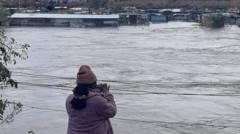As power is restored after an extensive outage that lasted about 18 hours, individuals reflect on the challenges faced during the blackout, including communication failures, transportation issues, and survival tactics.**
Nearly a Day Without Power: Residents of Spain and Portugal Recall a Day of Chaos**

Nearly a Day Without Power: Residents of Spain and Portugal Recall a Day of Chaos**
A widespread blackout leaves millions in Spain and Portugal grappling with the sudden absence of electricity and communication.**
On a seemingly ordinary afternoon in southeastern Spain, a dentist’s routine surgery turned into an unexpected challenge when the lights abruptly went out. Rocio Vilaplana, 36, found herself amidst a chaos spurred by a massive blackout that left residents of Spain and Portugal scrambling for answers and struggling to navigate a day without electricity.
As her emergency generator activated and the emergency lights dimly flickered to life in her surgery room, Vilaplana took a deep breath. “Let's just close it properly,” she reassured herself. Little did she know, this power failure was just the beginning of a tumultuous experience for millions across the two Iberian nations.
The blackout, which lasted approximately 18 hours, brought life to a standstill, leading to a range of distressing consequences. Many were forced to spend the night in train stations, huddled under blankets for warmth, while some remained trapped in their apartment buildings without running water or functional elevators. The absence of cellular service and internet left individuals isolated, grappling with the uncertainty of what had caused such widespread disruption.
By Tuesday morning, electricity was beginning to return gradually, although the overall cause of the outage was still under investigation. Residents in cities like Murcia echoed sentiments of “locura,” meaning madness, as they attempted to understand the ordeal.
71-year-old María José Egea reflected on her tense experience trapped in her apartment on the seventh floor, struggling without elevator access. She noted that “the worst was the lack of communication,” pointing to the communal concern that spread through her building, even as accurate information about the blackout remained elusive.
Tens of millions, forced to rethink daily routines and immediate resources, are now left to ponder the implications of such a precarious situation—even as life begins to return to normal.






















